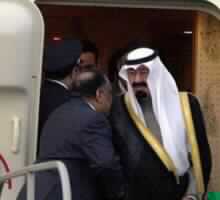- Author:
Reuters - Section:
WORLD HEADLINES
Saudi Crown Prince Heads to U.S. for Mideast Talks

HIGHLIGHTS: U.S.Saudi Relations Took a Beating After the Sep. Attacks.
Prince Abadallah on Record as Warning Washington, the Kingdom Could Be Forced to Review Its Relations With the U.S.
First Face-to-face Meeting With Bush Thursday.
STORY Saudi Crown Prince Abdullah headed to the United States Tuesday to try to persuade President Bush to be more even-handed in the Middle East conflict if he wants to keep his friends in the region. (Read photo caption within).
The Saudi Press Agency said the Prince flew from Casablanca, Morocco, where he was on holiday. It was not clear how long the trip, Abdullah's third to the United States, would last.
Saudi and U.S. officials say Abdullah will not mince his words when telling his strategic ally that Washington's support for Israel, particularly during the latest incursion into Palestinian areas, has seriously strained U.S.-Arab ties and jeopardized U.S. interests in the region.
The straight-talking prince, who launched a Middle East peace proposal adopted at an Arab summit last month, is also expected to convey to Bush just how much pressure its Arab allies are under because of public fury at U.S. foreign policy.
Abdullah is to hold his first face-to-face meeting with Bush at his Texas ranch Thursday. Saudi officials say the two leaders will discuss Palestinian-Israeli violence and ways to smooth U.S.-Saudi relations, which took a beating after the September 11, attacks on the United States.
"Those Arab friends of America who have moderate positions find themselves in an embarrassing spot," said Saudi columnist Abdel Wahab al-Fayez of al-Riyadh newspaper, which often reflects the government's view.
TRIP OFFERS ARABS "HOPE" FOR CEASEFIRE
Analysts say that Washington's special relationship with Israel -- and the apparent reluctance of the Bush administration to press Israeli Prime Minister Ariel Sharon -- have made Arabs lose what little respect they had for the United States.
Anti-U.S. sentiment is running high in the region, and especially in the pro-Western kingdom because the September 11 attacks prompted a Western backlash against Muslims and Arabs.
The terror attacks only hardened the stalemate between the allies. The prince had already snubbed an invitation to visit Washington last year in protest at a U.S. lack of engagement in the Palestinian-Israeli conflict and warned Bush the kingdom could be forced to review its ties with Washington.
After the September 11 attacks, in which 15 Saudi dissidents were allegedly involved, many Saudi citizens demanded the kingdom cut ties with Washington after the kingdom came under fire in the U.S. media.
But Prince Abdullah saw there was little to gain by turning his back on the United States. Instead, he decided to open up the kingdom to the media and explain its point of view.
In February, he used the New York Times newspaper to air his Middle East peace proposal which calls on Israel to withdraw from all Arab lands in return for full Arab diplomatic ties.
Sharon turned his nose up at the offer and Washington expressed reservations, aggravating Arab anger.
Washington's standing in the Arab world took another blow this month when it failed to stop an Israeli incursion into Palestinian areas or secure the release of Palestinian President Yasser Arafat who is still trapped in his West Bank compound.
PHOTO CAPTION:
Prince Abadallah bin Abdulaziz Al Saud, crown prince of Saudi Arabia, center, is greeted at Ellington Field in Houston Tuesday, April 23, 2002. The Prince is expected to meet with President Bush at his Crawford, Texas ranch on Thursday. (AP Photo/Pat Sullivan)
- Apr 23 10:32 PM
Related Articles
 Prayer Times
Prayer Times
 Prayer times for Doha, Qatar Other?
Prayer times for Doha, Qatar Other?
-
Fajr
04:58 AM -
Dhuhr
11:43 AM -
Asr
02:44 PM -
Maghrib
05:04 PM -
Isha
06:34 PM


 Home
Home Discover Islam
Discover Islam Quran Recitations
Quran Recitations Lectures
Lectures
 Fatwa
Fatwa Articles
Articles Fiqh
Fiqh E-Books
E-Books Boys & Girls
Boys & Girls  Ramadan
Ramadan Fatwa Audios
Fatwa Audios Month of Mercy
Month of Mercy Women
Women Eed Al- Fitr
Eed Al- Fitr Food Recipes
Food Recipes Videos
Videos













